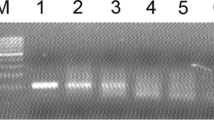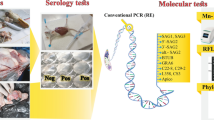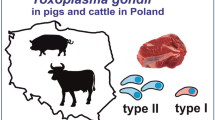Abstract
Free-range chickens are infected by Toxoplasma gondii (T. gondii) mainly when they pick-up their food from the ground. The present study was performed to estimate the molecular prevalence of T. gondii in free-range chicken meat (breast and thigh muscles) and their offal (heart and gizzard). The molecular characterization and the phylogeny of T. gondii amplicons were also investigated. Two PCRs were compared, the first targeting B1 gene and a nested PCR targeting the internal transcribed spacer ITS-1 gene. Among the 60 tested birds, 47 free-range chickens had at least one positive PCR, i.e., a prevalence of 78.3% (95% CI: 67.9–88.7%). The prevalence of T. gondii infection in muscles and organs analyzed by specific PCR targeting B1 gene (43.3%; 95% CI: 37–49.6%) was significantly higher than those analyzed for ITS-1 gene detection (15%; 95%CI: 10.4–19.5%) (p < 0.001). Heart samples had the highest T. gondii infection prevalence, as well as targeting either B1 gene (48.3%; 95% CI: 35.6–60.9%) or ITS-1 gene (21.6%; 95% CI: 11.2–32%). The present study showed that the consumption of undercooked free-range chicken meat represents a high risk for seronegative pregnant women. Our phylogenetic analysis revealed homology with wild and domestic birds and domestic mammals and a large geographic distribution.


Similar content being viewed by others
Data availability
All data generated or analyzed during this study are included in this published article and its supplementary information file.
References
Altschul SF, Gish W, Miller W et al (1990) Basic local alignment search tool. J Mol Biol 215:403–410. https://doi.org/10.1016/S0022-2836(05)80360-2
ANSES (2021) Fiche de description de danger biologique transmissible par les aliments : « Toxoplasma gondii ». Saisine n°2016-SA-0271
Boughattas S, Ayari K, Sa T et al (2014) Survey of the parasite Toxoplasma gondii in human consumed ovine meat in Tunis City. PLoS ONE 9:85044. https://doi.org/10.1371/journal.pone.0085044
Boughattas S, Bouratbine A (2014) Prevalence of food-borne Toxoplasma gondii in free-ranging chickens sold in Tunis, Tunisia. J Food Qual Hazards Control 1:89–92
Boughattas S, Bouratbine A (2015) Genetic characterization of Toxoplasma gondii isolated from chicken meats in Tunisia. J Food Qual Hazards Control 2:97–100
Codex Alimentarius (2005) Code of hygienic practice for meat 1 CAC/RCP 58–2005. 51
Djurković-Djaković O, Dupouy-Camet J, Van der Giessen J, Dubey JP (2019) Toxoplasmosis: overview from a One Health perspective. Food Waterborne Parasitol 15:e00054
Dubey JP (2010) Toxoplasma gondii infections in chickens (Gallus domesticus): Prevalence, clinical disease, diagnosis and public health significance. Zoonoses Public Health 57:60–73. https://doi.org/10.1111/j.1863-2378.2009.01274.x
Dubey JP, Huong LTT, Lawson BWL et al (2008) Seroprevalence and isolation of Toxoplasma gondii from free-range chickens in Ghana, Indonesia, Italy, Poland, and Vietnam. J Parasitol 94:68–71. https://doi.org/10.1645/ge-1362.1
Dubey JP, Pena HFJ, Cerqueira-Cézar CK et al (2020) Epidemiologic significance of Toxoplasma gondii infections in chickens (Gallus domesticus): The past decade. Parasitology 147:1263–1289
Dubey JP, Venturini MC, Venturini L et al (2003) Isolation and genotyping of Toxoplasma gondii from free-ranging chickens from Argentina. J Parasitol 89:1063–1064. https://doi.org/10.1645/ge-126
Dubey JP, Vianna MCB, Sousa S et al (2006) Characterization of Toxoplasma gondii isolates in free-range chickens from Portugal. J Parasitol 92:184–186. https://doi.org/10.1645/ge-652r.1
FAO, WHO, (2014) Multicriteria-based ranking for risk management of food-borne parasites. Microbiol RISK Assess Ser 23:1–302
Felsenstein J (1985) Phylogenies and the comparative method. Am Nat 125:1–15. https://doi.org/10.1086/284325
Geuthner AC, Koethe M, Ludewig M, et al (2019) Development of an in vivo model for Toxoplasma gondii infections in chickens and turkeys simulating natural routes of infection. Vet Parasitol 276. https://doi.org/10.1016/j.vetpar.2019.108956
GIPAC (2019) Groupement Interprofessionnel des Produits Avicoles et Cunicoles. http://www.gipac.tn/. Accessed 7 févr 2021
Hamidinejat H, Nabavi L, Mayahi M et al (2014) Comparison of three diagnostic methods for the detection of Toxoplasma gondii in free range chickens. Trop Biomed 31:507–513
Hurtado A, Aduriz G, Moreno B et al (2001) Single tube nested PCR for the detection of Toxoplasma gondii in fetal tissues from naturally aborted ewes. Vet Parasitol 102:17–27. https://doi.org/10.1016/S0304-4017(01)00526-X
Ivovic V, Vujanic M, Zivkovic T et al (2012) Molecular detection and genotyping of Toxoplasma gondii from clinical samples. Toxoplasmosis - Recent Adv. https://doi.org/10.5772/50830
Jones JL, Dubey JP (2012) Foodborne toxoplasmosis. Clin Infect Dis 55:845–851. https://doi.org/10.1093/cid/cis508
Kenny DA, Kashy DA, Cook WL (2006) Dyadic data analysis. Guilford Press
Khan MB, Khan S, Rafiq K, et al (2020) Molecular identification of Toxoplasma gondii in domesticated and broiler chickens (Gallus domesticus) that possibly augment the pool of human toxoplasmosis. PLoS One 15. https://doi.org/10.1371/journal.pone.0232026
Koethe M, Straubinger RK, Pott S et al (2015) Quantitative detection of Toxoplasma gondii in tissues of experimentally infected turkeys and in retail turkey products by magnetic-capture PCR. Food Microbiol 52:11–17. https://doi.org/10.1016/j.fm.2015.06.005
Kumar S, Stecher G, Li M et al (2018) MEGA X: Molecular evolutionary genetics analysis across computing platforms. Mol Biol Evol 35:1547–1549. https://doi.org/10.1093/MOLBEV/MSY096
Lachkhem A, Galal L, Lahmar I, et al (2021) First isolation and genotyping of Toxoplasma gondii strains from domestic animals in Tunisia. Sci Rep 11. https://doi.org/10.1038/S41598-021-88751-1
Landis JR, Koch GG (1977) The measurement of observer agreement for categorical data. Biometrics 33:159. https://doi.org/10.2307/2529310
Liu XC, He Y, Han DG, et al (2017) Detection of Toxoplasma gondii in chicken and soil of chicken farms in Nanjing region, China. Infect Dis poverty 6. https://doi.org/10.1186/S40249-017-0277-3
Lv QY, Quan MX, Tang HL, et al (2021) Seroprevalence, risk factors, and genotypes of Toxoplasma gondii in free-range chickens intended for human consumption in China. https://home.liebertpub.com/fpd 18:253–259. https://doi.org/10.1089/FPD.2020.2844
Minutti AF, Gonçalves Vieira FE, Sasse JP, et al (2021) Comparison of serological and molecular techniques to detect Toxoplasma gondii in free-range chickens (Gallus gallus domesticus). Vet Parasitol 296. https://doi.org/10.1016/J.VETPAR.2021.109515
Mose JM, Kagira JM, Karanja SM, et al (2016) Detection of natural Toxoplasma gondii infection in chicken in Thika Region of Kenya using nested polymerase chain reaction. Biomed Res Int 2016. https://doi.org/10.1155/2016/7589278
Nedişan ME, Györke A, Ştefănuţ CL et al (2021) Experimental infection with Toxoplasma gondii in broiler chickens (Gallus domesticus): seroconversion, tissue cyst distribution, and prophylaxis. Parasitol Res 120:593–603. https://doi.org/10.1007/S00436-020-06984-X
Opsteegh M, Langelaar M, Sprong H et al (2010) Direct detection and genotyping of Toxoplasma gondii in meat samples using magnetic capture and PCR. Int J Food Microbiol 139:193–201. https://doi.org/10.1016/j.ijfoodmicro.2010.02.027
Opsteegh M, Schares G, Blaga R, van der Giessen J (2016) Experimental studies on Toxoplasma gondii in the main livestock species (GP/EFSA/BIOHAZ/2013/01) Final report. EFSA Support Publ 13:995E. https://doi.org/10.2903/SP.EFSA.2016.EN-995
Paredes GFD, Ortega-Pacheco A, Rosado-Aguilar JA et al (2016) Toxoplasma gondii in meat for human consumption – a brief review of the most described strategies for its detection and quantification. Significance, Prev Control Food Relat Dis. https://doi.org/10.5772/63224
Rahumatullah A, Khoo BY, Noordin R (2012) Triplex PCR using new primers for the detection of Toxoplasma gondii. Exp Parasitol 131:231–238. https://doi.org/10.1016/J.EXPPARA.2012.04.009
Saitou N, Nei M (1987) The neighbor-joining method: a new method for reconstructing phylogenetic trees. Mol Biol Evol 4:406–425. https://doi.org/10.1093/OXFORDJOURNALS.MOLBEV.A040454
Schares G, Koethe M, Bangoura B et al (2018) Toxoplasma gondii infections in chickens – performance of various antibody detection techniques in serum and meat juice relative to bioassay and DNA detection methods. Int J Parasitol 48:751–762. https://doi.org/10.1016/j.ijpara.2018.03.007
Schwartz D (1993) Méthodes statistiques à l’usage des médecins et des biologistes, 4e édition. Flammarion Médecine-Sciences
Su C, Shwab EK, Zhou P et al (2010) Moving towards an integrated approach to molecular detection and identification of Toxoplasma gondii. Parasitology 137:1–11. https://doi.org/10.1017/S0031182009991065
Switaj K, Master A, Skrzypczak M, Zaborowski P (2005) Recent trends in molecular diagnostics for Toxoplasma gondii infections. Clin Microbiol Infect 11:170–176. https://doi.org/10.1111/J.1469-0691.2004.01073.X
Thomas M, Aubert D, Escotte-Binet S, et al (2022) Anatomical distribution of Toxoplasma gondii in naturally and experimentally infected lambs. Parasite 29. https://doi.org/10.1051/PARASITE/2022001
Wahab T, Edvinsson B, Palm D, Lindh J (2010) Comparison of the AF146527 and B1 repeated elements, two real-time PCR targets used for detection of Toxoplasma gondii. J Clin Microbiol 48:591. https://doi.org/10.1128/JCM.01113-09
Wana MN, Mohd Moklas MA, Watanabe M et al (2020) Molecular detection and genetic diversity of Toxoplasma gondii oocysts in cat faeces from Klang Valley, Malaysia, using B1 and REP genes in 2018. Pathog (basel, Switzerland) 9:1–16. https://doi.org/10.3390/PATHOGENS9070576
Wang Y, Tian RM, Gao ZM et al (2014) Optimal eukaryotic 18S and universal 16S/18S ribosomal RNA primers and their application in a study of symbiosis. PLoS ONE 9:e90053. https://doi.org/10.1371/JOURNAL.PONE.0090053
Yan C, Yue CL, Yuan ZG et al (2010) Molecular and serological diagnosis of Toxoplasma gondii infection in experimentally infected chickens. Vet Parasitol 173:179–183. https://doi.org/10.1016/j.vetpar.2010.07.011
Zrelli S, Amairia S, Mhadhbi M, et al (2021) High prevalence of Toxoplasma gondii in industrial Tunisian poultry meat. Acta Parasitol 10-14. https://doi.org/10.1007/s11686-021-00467-4
Acknowledgements
We are grateful to the staff of the laboratory of parasitology, National School of Veterinary Medicine of Sidi Thabet, Tunisia for their technical support.
Funding
This work was co-funded by the « Laboratoire d’épidémiologie d’infections enzootiques des herbivores en Tunisie: application à la lutte» [LR16AGR01] and « Laboratoire de Recherche: Gestion de la santé et de la qualité des productions animales» [LR 14AGR03] (Ministère de l’Enseignement Supérieur et de la Recherche Scientifique, Tunisia).
Author information
Authors and Affiliations
Contributions
SZ designed the work, performed the laboratory work and wrote the manuscript. SA contributed to the laboratory work and the writing of the manuscript. MJ contributed to the collection of samples. MG revised the paper, supervised the work. All the authors approved the final version of this article.
Corresponding author
Ethics declarations
Competing interests
The authors declare no competing interests.
Ethical approval
The study received ethical approval from the Animal Ethics Committee—National School of Veterinary Medicine IACUC, ENMV- Sidi Thabet, Tunisia (approval code: CEEA-ENMV 52/22).
Conflict of interest
The authors declare no competing interests.
Additional information
Section Editor: Berit Bangoura
Publisher's note
Springer Nature remains neutral with regard to jurisdictional claims in published maps and institutional affiliations.
Rights and permissions
Springer Nature or its licensor holds exclusive rights to this article under a publishing agreement with the author(s) or other rightsholder(s); author self-archiving of the accepted manuscript version of this article is solely governed by the terms of such publishing agreement and applicable law.
About this article
Cite this article
Zrelli, S., Amairia, S., Jebali, M. et al. Molecular detection of Toxoplasma gondii in Tunisian free-range chicken meat and their offal. Parasitol Res 121, 3561–3567 (2022). https://doi.org/10.1007/s00436-022-07680-8
Received:
Accepted:
Published:
Issue Date:
DOI: https://doi.org/10.1007/s00436-022-07680-8




